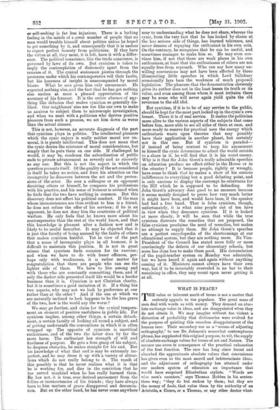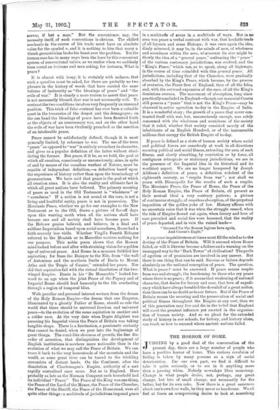WHAT IS PEACE ? T HE value or inherent merit of
terms is not a matter that seriously appeals to the populace. The great mass of men deal with words as with money. They demand an abso- lute exchange value in ideas, and are disappointed when they do not obtain it. We may imagine without too violent a distortion of probability that dictionaries were evolved for the purpose of quieting this ceaseless disappointment of the human race. Their secondary use as a "means of adjusting orthography," to use Dr. Johnson's somewhat contemptuous phrase, bas supplanted this original purpose, to wit, the supply of absolute exchange values for terms of art and Nature. The meaner use arose in consequence of the practical exhaustion of the first function. The race has long since learnt and absorbed the approximate absolute values that convenience has given even to the most sacred and indeterminate ideas, and the adjustment of orthography has attained under our modern system of education an importance that would have surprised Elizabethan stylists. " Words are wise men's counters," says Thomas Hobbes in his senten- tious way; " they do but reckon by them; but they are the money of fools, that value them by the authority of an Aristotle, a Cicero, or a Thomas, or any other doctor what- soever, if but a man." But the convenience, nay, the necessity itself, of such conventions is obvious. The skilled mechanic in the course of his trade must have an absolute value for the symbol I:, and it is nothing to him that many a Greek geometrician broke his heart over the problem. Yet the human race has in many ways been the loser by this convenient system of conventional values, as we realise when we suddenly turn round on lexicons and men asking, for instance, What is peace
It is almost with irony, it is certainly with sadness, that such a question must be asked, for there are probably no two phraies in the history of words that have carried the same volume of insincerity as " the blessings of peace" and " the evils of war." It is clearly a mere truism to assert that peace is not necessarily blessed, that war is not necessarily evil. To contrast the two conditions involves very frequently an unsound position. This trick of false contrast has ever been a valuable asset in the treasuries of the despot and the demagogue ; on the one hand the blessings of peace have been flaunted forth as the objects of an unnecessary war, and on the other hand the evils of war have been virulently preached as the sanction of an intolerable peace.
Peace cannot be satisfactorily defined, though it is most generally limited, by reference to war. The use of the term "peace" as opposed to "war" is entirely secondary in character, and gives us a popular definition of the latter without eluci- dating the former. But peace, if it be, as we hold, the goal at which all creation, consciously or unconsciously, aims, in spite of and by means of the ceaseless warfare of Nature, must be capable of independent definition, —a definition based' upon the experience of history rather than upon the terminology of grammarians. We have said that peace is the goal at which all creation aims. It is also the reality and ultimate fact in which all great nations have believed. The primary meaning of peace as used in the Old Testament is " wholeness " or " soundness." If a nation is not sound at the core, is not a living and healthful entity, peace is not in possession. The Messianic Peace, whether we go for our examples to the New Testament or to the Old, draws a picture of far-off days upon this warring earth when all the nations shall have become one and all society shall have become pure. If the Hebrew genius believed, and believes, in a final and sublime Imperialism based upon social soundness, Rome had a faith scarcely less virile. Whether Virgil's Fourth Eclogue referred to the Messiah or to Marcellus matters nothing for our purpose. This noble poem shows that the Roman mind looked before and after with straining vision for a golden age of universal peace. And Rome in a measure fulfilled her aspiration; for from the Dnieper to the Nile, from "the wall of Antoninus and the northern limits of Dacia to Mount Atlas and the Tropic of Cancer," extended her peace. Nor did that aspiration fail with the virtual dissolution of the two- winged Empire. Dante in his "De Monarchia " looked for- ward to an age when the joint Peace of the Papacy and of Imperial Rome should lead humanity to the life everlasting through a region of temporal bliss.
With peculiar and personal interest we turn from the dream of the Holy Roman Empire—the dream that one Emperor, illuminated by a ghostly Father at Rome, should so rule the world that there should be universal freedom and universal peace—to the evolution of the same aspiration in another and a colder race. At the very date when Dante Alighieri was pursuing his Imperial vision the Peace of Britain was taking tangible shape. There is a fascination, a passionate curiosity that cannot be denied, when we peer into the beginnings of great things. The coral-like slowness of growth, the fine dis- order of accretion, that distinguishes the development of English institutions is nowhere more noticeable than in the evolution of what we may call the Peace of Britain. We can trace it back to the very homesteads of the mountain and the weald, as some great river can be traced to the trickling streamlets of distant lands. On the Continent, after the dissolution of Charlemagne's Empire, authority of a sort rapidly centralised once more. Not so in England. Here probably as late as the Norman Conquest each household had its individual " Peace." The Peace of the King was one thing, the Peace of the Lord of the Manor, the Peace of the Churches, the Peace of the Sheriff, the Peace of the Homestead, were all quite other things : a multitude of jurisdictions imposed peace in a multitude of areas in a multitude of ways. But in no area was peace a verbal contrast with war, that laudable trade of all laymen and some Bishops ; it was once again the idea, dimly mirrored, it may be, in the minds of men, of wholeness and soundness within the area, wl-atsoever its size might be Slowly the idea of a " general peace," embracing the " peace " of the various customary jurisdictions, was evolved, and the "Kings Peace," 'which ran, so to speak, along all highways, in the course of time coincided with this general peace. All jurisdictions, including that of the Churches, were gradually absorbed by the King's Peaoe, which became, by the process of centuries, the Peace first of England, then of all the Isles, and, with the outward expansion of the race, of all the King's dominions oversee. The movement of absorption, long since practicallyconcluded in England—though our manorial Courts still possess a " peace " that is not the King's Peace—may be observed in active operation to-day in' the Empire of India. It is a wonderful story; the growth of a peace that never con- trasted itself with war, but, unconsciously enough, was solely concerned with the wholeness and soundness of the society that it ruled, whether that society consisted merely of the inhabitants of an English Hundred, or of the innumerable millions that occupy the British Empire of to-day.
If peace is defined as a state of human society where social and political forces are ceaselessly at work in all directions securing political and social fitness, extending the area of such fitness, and slowly absorbing, by conviction or by force, all contiguous retrograde or stationary jurisdictions, we are in the presence of the Imperial idea in its historical and its worthiest aspect. We are no longer hampered by Joseph Addison's definition of peace, a definition redolent of the eighteenth century, as " respite from war "; nor shall we yearn with Dicaeopolis for the results of such a respite. The Messianic Peace, the Peace of Rome, the Peace of the Holy Roman Empire, the Peace of Britain, all present as their mutual ideal a very contrary pattern; a picture of continuous struggle, of ceaseless absorption, of the perpetual imposition of the golden yoke of law. History affirms with no uncertain voice that it was when the struggle ceased, when the tide of Empire flowed out again, when luxury and love of ease prevailed and social ties were loosened, that the reality of peace departed, and in vain the ruined lands-
" Groaned for the Roman legions here again, And Caesar's Eagle."
A supreme inquisitiveness at times must fill the mind as to the destiny of the Peace of Britain. Will it succeed where Rome failed, or will it likewise become a failure and a warning on the unmapped way to the " Dark Tower" of civilisation P The perils of egotism or of pessimism are involved in any answer. But there is one thing that can be said. Success or failure depends absolutely on the national conception of peace. The question, What is peace P must be answered. If peace means respite from war and struggle, the hearkening to those who cry peace where there is no peace ; if it means that weakening of national character, that desire for luxury and ease, that love of expedi- ency which have always heralded the downfall of a great nation, then there can be no doubt as to our future. But if the Peace of Britain means the securing and the preservation of social and political fitness throughout the Empire at any cost, then we of this generation may live and die in the belief that England will exert the greatest influence yet exerted in the organisa- tion of human society. And so we plead for the extended study of history in our schools, for history, and history alone, can teach us how to succeed where ancient nations failed.











































 Previous page
Previous page